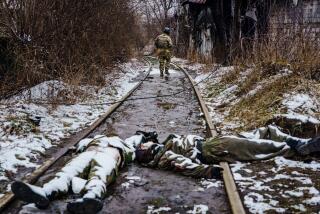Disturbing views on Taliban’s work
For abject gloominess, it would be hard to top “The War Briefing,” “Frontline’s” deeply reported look at the war in Afghanistan and the insurgency targeting Pakistan.
“Briefing” finds nothing but bad news for the U.S. and NATO effort -- not enough Western troops, weak central governments in Kabul and Islamabad, and an enemy funded by heroin profits and increasing in size and lethality.
Try this for a nightmare scenario -- a witch’s brew of Taliban and Al Qaeda, using the mountain region between the two countries as a sanctuary, succeeds in toppling the governments in Afghanistan and Pakistan, the latter possessing nuclear weapons. “Briefing” trots out several experts to suggest it’s entirely possible.
“You have now this gigantic movement of the Taliban, spreading in both directions,” says New York Times reporter Dexter Filkins.
Even with the U.S. mission in Iraq drawing down, the U.S. lacks enough troops to rush large numbers to Afghanistan, “Briefing” argues. The Russians tried to control Afghanistan with 100,000-plus troops and failed; the U.S. has about 35,000 and is struggling.
“Briefing” brings together journalists, diplomats and others, along with film from a cameraman embedded with U.S. Army troops in the Korengal River Valley, a major Taliban smuggling route. The result is persuasive and scary.
The major thesis is not new -- that the U.S. didn’t follow through after the quick knockdown of the Taliban following the terrorist attacks of Sept. 11, 2001. But “Frontline” has the facts and the on-the-ground feeling to make it stick.
“The Taliban were not defeated in 2001,” says Said T. Jawad, Afghan ambassador to the U.S. “There was never enough military presence to defeat them. They were pushed into Pakistan.”
In the tribal areas, where warlords rule, the Taliban found “the ideological, logistical and financial support to regroup,” Jawad says. The Pakistan security forces are said to have a natural affinity with the Taliban. Many Pakistanis are convinced that the U.S. is in league with India, Pakistan’s archenemy, to turn Afghanistan into some sort of anti- Pakistan beachhead.
Even when the Pakistan military has tried to shut down the smuggling routes, the results have been marginal. A plan to bribe warlords to stop cooperating with the Taliban hasn’t worked well.
“The fact of the matter is those who, I think, practice extreme violence can be rented for a short period of time, but they can’t be bought,” says Richard L. Armitage, a former U.S. State Department official. “And that is what the government of Pakistan is finding out.”
The Afghanistan-Pakistan dilemma awaits the next president. Amid the financial meltdown, the issue has been pushed to the side, with both candidates agreeing something has to be done if the U.S. is to prevent a Taliban victory.
Military scholar Anthony Cordesman gets the last word.
“Far too few troops will ensure that we lose,” he says. “In the average counterinsurgency, where our side and the government wins, it took 14 years. This is an immense task.”
--
--
‘Frontline: The War Briefing’
Where: KCET
When: 9 tonight
Rating: TV-PG (may be unsuitable for young children)
More to Read
Start your day right
Sign up for Essential California for news, features and recommendations from the L.A. Times and beyond in your inbox six days a week.
You may occasionally receive promotional content from the Los Angeles Times.






